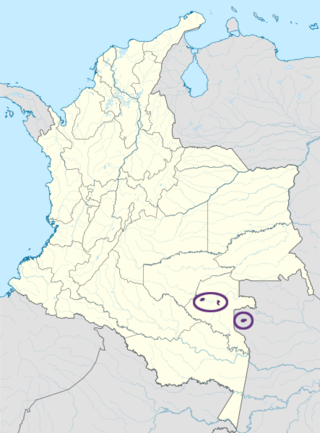Carapana language
| Carapano | |
|---|---|
| Mõxtã | |
| Native to | Colombia, Brazil |
Native speakers | 500 (2012)[1] |
Tucanoan
| |
| Language codes | |
| ISO 639-3 | cbc |
| Glottolog | cara1272 |
| ELP | Carapana |
 | |
Carapano (Karapanã, Carapana-tapuya, Möxdöá) is a Tucanoan language of Colombia and Brazil.
Phonology
Carapano has 11 consonants.[2]
| Bilabial | Alveolar | Palatal | Velar | Glottal | ||
|---|---|---|---|---|---|---|
| Plosive | voiceless | p | t | k | ||
| voiced | b | d | g | |||
| Fricative | s | |||||
| Tap | ɾ | |||||
| Approximant | w | j | h | |||
- /p, t, k/ alternate with /pʰ, tʰ, kʰ/.[3]
- /b, d, g/ become [m, n, ŋ] before nasal vowels.[3] They become [ᵐb, ⁿd, ᵑg] after nasal vowels.[3]
- /b, d/ alternate with [ᵐb, ⁿd] at the beginning of a word, e.g., báì /báì/ [báì]~[ᵐbáì] 'younger brother'.[3]
- /s/ alternates with /t͡s/.[4]
- /ɾ/ has three variants
- /w, h/ are often [β, x] before front vowels.[4]
- /j/ alternates with pre-stopped [ᵈj].[4]
- /w, j, h/ become [w̃, j̃, h̃] before nasal vowels.[4]
It also has 6 vowels and their nasalized forms, plus high and low tones.[2]
| Front | Central | Back | |
|---|---|---|---|
| Close | i ĩ | ɨ ɨ̃ | u ũ |
| Mid | e ẽ | o õ | |
| Open | a ã |
- The mid vowels /e, ẽ, o, õ/ are phonetically [ɛ, ɛ̃, ɔ, ɔ̃].[5]
- Mid tone is an allotone of the low tone.[6]
Orthography
Metzger and Metzger use the following orthography.[7]
| IPA | Orthography |
|---|---|
| a | a |
| e | e |
| i | i |
| o | o |
| u | u |
| ɨ | ʉ |
| ã | ã |
| ẽ | ẽ |
| ĩ | ĩ |
| õ | õ |
| ũ | ũ |
| ɨ̃ | ʉ̃ |
| b | b, m |
| d | d, n |
| j | y, ñ |
| g | g, gu |
| h | j |
| k | c, qu |
| p | p |
| r | r |
| s | s |
| t | t |
| w | w |
| ◌́ | ◌́ |
| ◌̀ | not marked |
References
- ^ Carapano at Ethnologue (25th ed., 2022)

- ^ a b Metzger & Metzger 1973, p. 126.
- ^ a b c d Metzger & Metzger 1973, p. 127.
- ^ a b c d e Metzger & Metzger 1973, p. 128.
- ^ Metzger & Metzger 1973, p. 130.
- ^ Metzger & Metzger 1973, p. 131.
- ^ Metzger & Metzger 1973, p. 132.
Works cited
- Metzger, Ronald; Metzger, Lois (1973). "Fonología del carapana". Sistemas fonológicos de idiomas columbianos (in Spanish). Vol. 2. Instituto Lingüístico de Verano. pp. 121–132.
